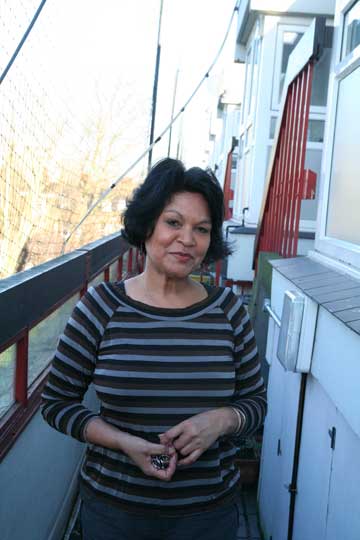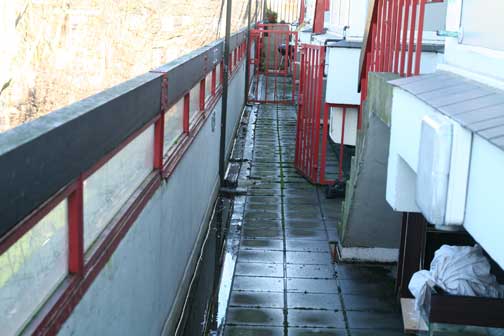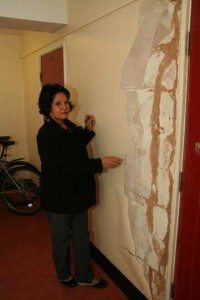
The issues in this case – and others concerning local authority leasehold – will be debated tomorrow morning on BBC Five Live with Eric Pickles, Communities Secretary, and Sebastian O’Kelly, of LKP, at 11.30am, Sunday January 12

A disastrous act of defiance in refusing to pay her share of a council’s major works scheme has cost Farieda Chandoo, 60, – who once looked after the five-year-old George Osborne – nearly £100,000.
She will also almost certainly have to sell her three-bedroom, split-level former council flat after being bailed out by her mortgage lenders.
Farieda, who was born in Trinidad, bought her comfortable flat in a 1970s three-storey block for £42,000 in 1997 from the former council tenant who had exercised the right to buy.
But she refused to accept that a £3.8 million refurbishment of the Brandon Estate, between Camberwell and the Oval, was necessary and believed the works to have been appallingly carried out. Her block, Kirwyn Way, had to pay £1.1 million.
As a result, she withheld payment of £40,000, which was her share for the works, setting in train a series of disasters which resulted in her facing a four-day forfeiture hearing at the county court last month (December 10 2013).
She now faces a total bill of nearly £100,000, and it could be more once the cost of the mortgage lender’s bail out is added to the total. The flat itself is only valued at £195,000.
“At one point I even got in touch with George Osborne’s mother through their business address,” says Farieda. “I hated to do it as it was like putting out the begging bowl.
“George was a lovely little boy and I was very fond of the family. But I never heard anything back. It was a long time ago.”
As she has always been in full-time employment as an NHS secretary, Farieda was the only leaseholder in Kirwyn Way who paid the full amount.
“I have always paid my service charge and I do not expect something for nothing,” says Farieda. “But I just will not pay for things that I did not receive.
“These works were badly carried out and made my life worse rather than improved it, so I refused to pay and fought the council in the Leasehold Valuation Tribunal.”
That took place in January 2011 and Farieda, who spent £500 on legal preparation for the case, was yet another lay applicant leaseholder to fail to persuade a tribunal when up against a legally represented freeholder.
In this case, however, and in contrast to so many private freeholders who use legal costs to play the Leasehold Valuation Tribunal system, Southwark did not ask for its legal costs at all.

Farieda’s argument was that the costs for council leaseholders should be capped at £10,000 – something which Eric Pickles, the Communities Secretary, is keen to introduce, although the figure will be higher in London at £15,000.
She also produced a string of complaints about the works, most of which were rejected.
But the builders did put a hole in the roof causing a leak to her flat. In addition, a front porch was erected which the tribunal ruled was not refurbishment, but new works, and the cost was removed from Farieda’s bill.
Nonetheless, on almost all points her arguments failed.
The tribunal ruled:
“This is yet another case of a leaseholder who has purchased a right to buy property from the original purchaser at the full market price, believed the property to be in good or at least acceptable condition and is then confronted with a bill for major works for over £38,000 which she is unable to afford and which had been imposed upon here by the landlord’s implementation of the Government’s Decent Homes Initiative.”
As well as considering the sum unjust, Farieda was simply unable to pay it, although Southwark does run a low interest loan scheme for council leaseholders in these positions. “But I could not afford to pay £600 a month more,” said Farieda. She also refused to accept that she needed to.
She continued to dispute the amount, spending £13,000 on a solicitor and £2,000 on a surveyor to examine the works at Kirwyn Way.
Nonetheless, she was without any professional representation at the four-day county court hearing that started on December 10.
Why a forfeiture hearing should be assigned four days is a question that requires an answer, but Farieda was unshakeable in her belief that she could re-fight the battle lost in the LVT and assembled her arguments according.
LKP, which was contacted before the case, urged dialogue with the council to avoid a further avalanche of costs for the legal profession – and the charges of Farieda’s mortgage lender.
The result of the four-day hearing has been an utter disaster.
On this occasion, Southwark deployed a barrister and sought and obtained £24,000 in costs.
“I will have to sell my flat because of this and I have no idea what I will do,” she says. “I will have to move into some bedsit somewhere. This case has brought me utter ruin.”

How she has managed to carry out a full-time job in the face of this litigation is astonishing.
What can be done to stop more cases like Farieda Chandoo’s?
It is a failure all round that this case came to court and that a dignified, independent woman is almost certainly going to have to sell her home and go into rented accommodation.
It is an open question why the judiciary permitted a four-day forfeiture hearing with a lay applicant.
Forfeiture can be lifted in 10-minute hearings where mortgage lenders agree – as they usually do – to pay the outstanding debt.
If there was no chance of Farieda interesting the court in her complaints about the necessity and quality of the works at Kirwyn Way, then one has to ask whose interests were served by holding a protracted case.
When she was first presented with an eye-watering bill for the works, Farieda consulted her MP, Harriet Harman, and John Prescott, then deputy prime minister and the Communities Secretary.
There was a move to limit leaseholders’ liability in major works to £10,000, but it did not apply to Farieda.
Eric Pickles, the Conservative Communities Secretary, is now attempting to introduce this scheme. He was indignant at the case of local authority leaseholder Florence Bourne, 93, in Newham, north London, who died tormented by the fear that she would have to pay £50,000 towards the refurbishment of her block.
The proposal is that over a five-year period, local authority leaseholders will have a cap of £10,000 (£15,000 in London) for five years.
Of course, this scheme would not have assisted Farieda who has lived in her home since 1997.
Southwark is considering a scheme to offer to buy back ex-council flats from leaseholders who cannot afford to pay for the major works.

Inevitably, this gives rise to suspicions that Southwark will abuse its whip hand forced down prices before snapping them up.
In the case of Farieda Chandoo, there have been failings. She did need help, rather than being financially ruined. She did look into selling her flat back to the council or a housing association, but these solutions failed.
She is still bitter about the quality of the works: pointed to fractured masonry, rotting woodwork, rainwater accumulating on the flat roofs.

It is all too likely that Kirwyn Way will need another refurb at some point in the not too distant future.
The accommodation standards fall well short of the truly opulent council offices enjoyed by Southwark’s housing staff in Tooley Street, beside London Bridge.
We must hope that Farieda Chandoo is the last of Southwark’s leaseholders to suffer these sorts of losses in the courts.
Farieda Chandoo’s LVT ruling can be read here




 Benjamin Mire has been in front of tribunal 52 times since 1999
Benjamin Mire has been in front of tribunal 52 times since 1999





















